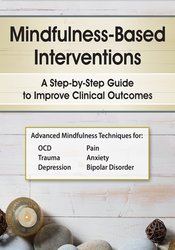

Mindfulness can truly be a powerful tool when helping clients, however, far too often we use the same common mindfulness techniques for each situation.
That approach short changes your client and won’t get you the best results. To truly unlock the power of mindfulness, you need to be able to adapt mindfulness techniques to each unique situation in a way that will lead to lasting results.
Watch this recording and get detailed guidance on the how, why, and when of incorporating core and advanced mindfulness skills into your clinical practice.
You’ll walk away knowing how to apply brain-changing mindfulness skills specifically tailored to:
Buy today and get step-by-step instruction on specific interventions you need to treat a variety of disorders and populations!
This online program is worth 6.25 hours CPD.
| File type | File name | Number of pages | |
|---|---|---|---|
| Manual - Mindfulness-Based Interventions (4.89 MB) | 39 Pages | Available after Purchase |
R. Brian Denton, PsyD, PhD, is a licensed psychologist in Cleveland, Ohio. Dr. Denton completed his undergraduate work (BA) in psychology at Case Western Reserve University in Cleveland, OH, a Master’s degree in Clinical and Counseling Psychology (MA) from Cleveland State University, and a Doctorate in Clinical Psychology (PsyD) from the School of Professional Psychology at Wright State University in Dayton, Ohio. Dr. Denton also received a Doctorate (PhD) in Buddhist Studies from Buddha Dharma University.
Dr. Denton has studied the Eastern Wisdom traditions extensively over the past 20 years, having traveled to a variety of training centers and monastic institutes around the United States and overseas to study meditation practices and their application to human psychological functioning. He is a Zen Teacher and was given transmission as a Zen Master. He has lead mindfulness and meditation retreats, teaches independently, and utilizes his expertise in mindfulness within psychological treatment.
Dr. Denton has published on Mindfulness-Based treatment approaches as the lead author of the chapter “Clinical Uses of Mindfulness” in Innovations in Clinical Practice, and as third author of the book Mindfulness in Clinical Practice, a primer of mindfulness-based treatment approaches. He is an experienced and sought-after presenter on a wide range of topical areas, and in particular for trainings around Mindfulness, ACT, Inclusion/Diversity and Sexuality.
Speaker Disclosures:
Financial: Robert Denton is in private practice. He receives a speaking honorarium from PESI, Inc. He has no relevant financial relationships with ineligible organizations.
Non-financial: Robert Denton is a member of the Association of Contextual Behavioral Science; American Psychological Association; and the Ohio Psychological Association.
Satisfaction Guarantee
Your satisfaction is our goal and our guarantee. Concerns should be addressed to info@pesi.co.uk or call 01235847393.
Please wait ...